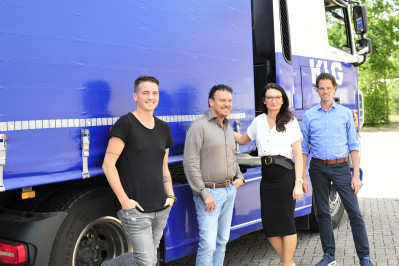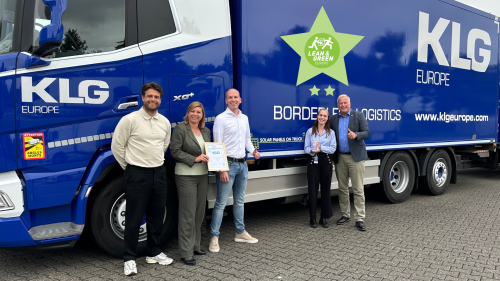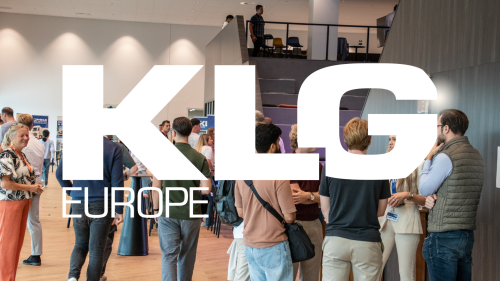Leaders in Logistics
30 juni 2022KLG Europe gives space for young talent
Top 100 logistics service providers show how companies know how to make a difference. KLG Europe profiles itself with renewed labor market policy. As a panel member of the top 100, Michiel Maassen asks Erik Loijen questions about this. "Why do you search for people locally and not centrally?"

The KLG Europe office in Venlo is buzzing with activity. The parking lot is crowded and there is a pleasant atmosphere at the entrance. People greet each other and the visitors also receive a friendly "hello" from everyone. Michiel Maassen, a panelist on the Top 100 Logistics Service Providers, is visiting Erik Loijen, CEO of the company. The logistics company had in fact caught Maassen's positive eye when reviewing surveys. One reason was that KLG is "Best Training Company" in the entire industry. But especially because of its interactions with schools and students.
50 internships per year
Maassen: "Erik, I saw in your application for the Top 100 Logistics Service Providers that every year you give over fifty interns and graduates the opportunity to participate in KLG and do research. This is remarkable, because it means that middle and senior management are also willing to invest time in this. Not many logistics companies do that yet. Trainees are often brought in for assignments and no thought is given to supervision and bonding. Since when do you not see people as means of production, but that you need people who come in, who are going to experience the culture and contribute to it?"
Loijen: "At some point we figured out that these are our employees of the future and can add value for the future. That is why for about ten years we have been sharpening our contact with educations. As KLG Europe, we have to compete against large organizations, but we are now Best Training Company and Most Attractive Employer. That is very strong commercially."
"At KLG, we have determined that we always have five attractive assignments on the shelf for graduates. Even if we do not need graduates, or if there is concern that they will leave immediately after the assignment. Not everyone can stay, but there are also examples of good former trainees who did stay and after a number of years are managing a department. Then I am easily in the race: if there is no assignment, it has to come. Of course it takes time, but it has to get sustained attention. If we step on the brakes now, we throw away everything we have done. We are growing, so we always need new employees. That is why we always offer good intermediate and higher vocational students a job after an internship, even if there is actually no work at that time. Look, you can all buy an office chair and screen, but the staff makes KLG."
Retaining staff in times of crisis
Loijen: "Even in times of crisis we stayed in touch with schools. Of course you first look at the changes in the world, but at some point you flip the switch: 'We will get through it'. So we discussed internships with schools, preferably at our office.
Maassen: "How do you anticipate the forecast? There are all kinds of emotions at play, we see retail slowing down, trade declining... Are you going to scale back on personnel?"
Loijen: "No. KLG has strong organic growth from the bottom up. So we will have to make sure that more business comes in. We are working for the long term and if good employees want to stay, we have to make sure there is enough business for that. During the financial crisis, when our sales went down by over 20%, of course we had to do something. But we did not talk about our Planners for a moment: they all had to stay. You must not destroy the core of your business. In the end, this continuity generated customer loyalty, because we considered their lead times more important than a full truck."
Staff retention and advancement
Loijen: "If we have a vacancy, we always check whether there is someone internally who can and wants to do this. Intermediate vocational trainees also get the chance to move on. We discuss their ambitions with them. Sometimes we even tell them to go on to higher vocational education first and then come back. We also tell them if we feel they are not up to it. Incidentally, there are also many employees who do not want to grow. We are also very happy with that, that they want to stay in a certain position for the next ten years."
Maassen: "Just a moment ago you talked about the Best Training Company. At some point KLG gets a good name in the industry. That personnel with you get a nice foundation. Do other logistics companies not try to take over your people?"
Loijen: "Of course it is possible that employees look for another employer after their internship. It is a trial period for both. And yes, people are approached by other employers because we are known as one of the better employers in the regions where we are located. But then the nice thing is that they come into my office to tell me who they were approached by. The grass may sometimes seem greener somewhere else, but employees know that the grass is always well cut here, these are the words of an employee that completely encapsulate the feeling. We should not start inhibiting ourselves on their flow for fear they will leave, but internally make sure it is right. We see very little turnover in our branches. Of course, sometimes a rotten apple has to leave. Then I think clarity is important. I would rather we put in extra effort as a group, than have the wrong employee hired or stuck around."
Local involvement and culture
Maassen: "I notice that KLG looks for employees locally. Larger companies in the top 100 often have their HR centralized."
Loijen: "Yes, we really search regionally in Venlo, Eersel, Rotterdam and from now on also Waalwijk. Because of shortages in Venlo, that does extend here to educational institutions such as the HAN and Maastricht. We have a local HR policy, where HR is supportive. The manager of the department decides who joins the team."
Maassen: "How do you deal with different nationalities within the company. Especially now that you are doing business with China since the acquisition?"
Loijen: "We already have different nationalities because we do international business. Chinese people have a very different way of communicating and working, we already knew this, we used to have branches in China. This is why we have set up a 'China Desk.' A number of employees act as a kind of filter that determines what goes to which colleague within the organization and what has to go back to China. As an organization we look for solutions, so do not come to me with "it is not possible". We discuss within the group what we encounter and how others pick it up. Doors are open here."
Maassen: "So you listen to the problem that is there, and do not take it as a given but look for a solution to this communication problem."
Everything revolves around employees
Loijen: "The KLG blue had to stay KLG blue. Employees are our DNA, you should not mess with that. The new owners understand that very well. I have also asked the people who have been employed here for a long time, and they do not notice that anything has changed."
Maassen: "I did not rate you too high for the top 100. I think you differ from other organizations, which often shout things but do not do it. This interview is confirmation to me that good dealings with staff are absolutely in your DNA. I find that very cool to see. It is all about employees here, not about the brand on the facade or about management, but about the people who have to do it."
Source: Based on article via logistiek.nl (article only available in Dutch).
More news
We would like to get in touch with you.










